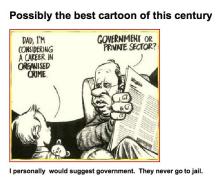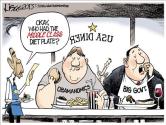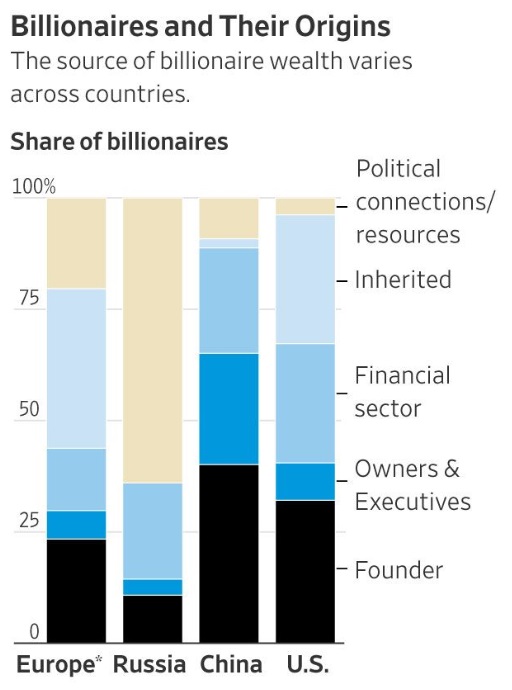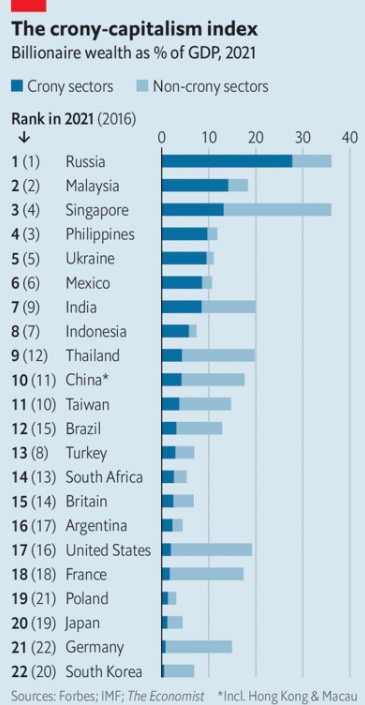Very Little Sympathy for Russian Oligarchs
I enjoy defending rich people. In part, that’s because I appreciatehow rich entrepreneurs make life better for me and everybody else.
But I also defend rich people because of my deep disdain for the policy agenda of empty-suit politicians and envy-wracked demagogues.
If we want outcomes that are better for society and the economy, I’m 100-percent confident that Jeff Bezos and Elon Musk can spend their wealth better than the hacks and clownsin Washington.
But what if rich people get money from government cronyism? What if they became wealthy because of special favors from politicians?
Greg Ip of the Wall Street Journal wrote about this issue a couple of years ago and included this chart showing that cronyism is a small problem in the United States but a big problem in Russia.
Here’s some of what Mr. Ip wrote about Russia’s cronyism.
How a billionaire earns his or her fortune matters, of course. Some are “rent seekers,”
meaning they skim off the productive efforts of others via corruption, royal prerogative or control of some valuable market or resource. That’s why Russia is an outlier in Ms. Freund’s research: lots of oligarchs, with not much economic benefit to show for it.
Since he wrote that article well before Russia’s invasion of Ukraine, he wasn’t focused on the geopolitical considerations that are dominating the discussion today.
So now let’s look at a very recent report from the U.K.-based Economist. Here are some key excerpts.
…the sanctions levied at Russian oligarchs have intensified scrutiny on the origins of tycoons’ wealth. …Rent-seeking entrepreneurs tend to use their relationships with the state to maximise profits.
…Our index uses 25 years of data from Forbes’s annual stock-take of the world’s billionaires. …We have classified the main source of each billionaire’s wealth into crony and non-crony sectors. …Russia’s crony economy sticks out like a blinged-up Muscovite… Some 70% of the 120 Russian billionaires, who together hold 80% of its billionaire wealth, fall within our crony-capitalist definition. Wealth equivalent to 28% of Russia’s gdp in 2021 came from crony sectors, up from 18% in 2016.
The bottom line is that Russia’s “oligarchs” are not like the self-made billionaires that we’re fortunate to have in the United States.
Here’s the accompanying chart from the article. Russia does stand out…in a very bad way. If the numbers are accurate, getting in bed with politicians is the way to get rich.
Now that we’ve established that Russian billionaires generally don’t earn their money, this leads us to the more challenging issue of whether nations such as the United States should freeze and/or expropriate the wealth of the oligarchs in response to Putin’s invasion of Ukraine?
Since I’m not a lawyer or an expert on foreign and defense issues, I don’t pretend to know the best approach. I want Putin and his cronies to suffer, but I also have some qualms about the current approach.
- Is the “rule of law” being overlooked and “due process” getting trampled in the rush to go after the assets of wealthy Russians, some of whom may have emigrated because of their opposition to Putin?
- Are people being targeted simply because of their Russian ethnicity, just as an awful president targeted Americans of Japanese descent during World War II?
- If getting rich through cronyism is a sufficient pretext to confiscate wealth, does that mean it’s okay to seize the assets of ethanol producers and stockholders of Fannie Mae and Freddie Mac?
P.S. For what it’s worth, my gut instinct is that cronyism is a much bigger problem in China’s economy that we see in the data from the WSJ and the Economist.
P.P.S. Click here to learn more about “rent seeking.”
“Is Capitalism “Pro-Business?”
Find LearnLiberty on Facebook: http://on.fb.me/X9qijG
In this video, Professor Steve Horwitz advocates for free market economic policy. He refutes the often recited claim that “What is good for General Motors is good for America” by explaining that pro-business legislation encourages behavior that is not beneficial to society or the business itself. He suggests that, in a free market, factors such as profit and competition encourage behavior that ultimately benefits society. Professor Horwitz illustrates that pro-business legislation restricts progress and therefore caters to the interests of industry rather than to consumers, whereas “supporters of free markets are ultimately pro-human and pro-people because it is through markets that we get the most innovation and we get the most goods and the cheapest prices.”
Find LearnLiberty on…
Twitter: http://bit.ly/RBl3Wv
Facebook: http://on.fb.me/X9qijG
Our Website: http://bit.ly/RBl3FH
____________________________
Big Government cronyism lines the pockets of dishonest companies!!!!
The Biggest Impediment for the Poor Is Government, not Inequality
January 21, 2014 by Dan Mitchell
A bunch of well-connected rich people and government officials are descending upon Switzerland for the annual World Economic Forum meeting in Davos.
 This upsets many people, and perhaps with some justification. After all, bad things often happen when big business and big government intersect.
This upsets many people, and perhaps with some justification. After all, bad things often happen when big business and big government intersect.
But some folks reflexively think that wealth is bad and they would like us to believe that the economy is a fixed pie, meaning that the rich have more money because the poor have less money.
If you think I’m exaggerating, check out a new report from Oxfam, a UK-based group that was created to alleviate poverty but has largely morphed into a left-wing pressure group.
The folks at Oxfam complain about the supposed “capture of opportunities by the rich at the expense of the poor and middle classes” and that “tax rates for the richest have fallen in 29 of the 30 countries.”
Here are some excerpts from a report in the EU Observer.
As the world’s richest and most powerful men and women prepare to meet in the Swiss resort of Davos for the annual World Economic Forum on Wednesday (22 January), the British development charity, Oxfam, has issued a new report on global inequality. According to its findings, the wealth of the world’s 85 richest people – €81.2 trillion – amounts to that of the poorest half of the world population, or 3.5 billion people. …”In Europe, austerity has been imposed on the poor and middle classes under huge pressure from financial markets whose wealthy investors have benefited from state bailouts of financial institutions,” the charity said. Financial deregulation in the US has contributed to the situation, in which the richest one percent of the population has more money than ever since 1933. …The charity said Davos participants should reverse the trend and pledge to support higher taxes for the rich, while refraining from using their wealth to seek political favours.
There are several parts of this excerpt that deserve attention, including passages that are correct (such as bailouts giving undeserved money to the rich) and passages that are nonsensical (the financial crisis was caused by intervention, not deregulation).
But I want to focus solely on the inequality issue. Let’s assume Oxfam is right and that the world’s 85 richest people have $81.2 trillion of wealth. The group obviously wants us to think this accumulation of wealth is bad and that it somehow comes at the expense of the rest of us.
Tim Carney of the Washington Examiner hits the nail on the head, explaining that there’s a big difference between honest wealth and riches obtained through government coercion.
…is it a bad thing for a country to have some really rich people? Again, it depends on how they got rich. Sutirtha Bagchi of the University of Michigan’s business school and Jan Svejnar of Columbia’s School of International and Public Affairs studied how inequality correlates with economic growth. In general, more inequality meant slower growth, and less inequality meant faster growth. But in many countries, over various time periods, growing inequality had no effect on economic growth. The new study suggests that an increase in inequality hurt the economy when the rich were getting rich through political connections. That is, inequality hurts the economy when “a large share of the national wealth is held by a small number of politically connected families,” as the authors put it. …Bagchi and Svenjar took pains to classify political billionaires as narrowly as possible. …The political billionaires were only people who “would not have become a billionaire in the absence of political connections that resulted in favoritism and/or explicit government support.”
The oft-missed lesson here is that undeserving wealth generally is obtained because of big government.
Which reminds me of a very astute observation by a former Cato colleague, who wrote that, “…the more power the government has to pick winners and losers, the more power rich people will have relative to poor people.”
Carney continues, pointing out that wealth obtained through markets is good. Such success creates a bigger pie and helps boost living standards for everyone.
But wealth achieved via government is cronyism, and that contributes to economic stagnation.
When a country’s wealthiest got wealthy through market means, the resulting inequality has no negative effect on economic growth. This jibes with what we know about free markets. If people can get rich by providing valuable things at good prices, then society will get more valuable things at good prices—and people across the income spectrum benefit. But if people get rich by pocketing subsidies and using the state to crush competitors, then they gained their wealth at the expense of everyone else. Bill Gates became a billionaire by making and selling something that makes regular people more productive and more connected. Buffett got rich largely by providing capital to underfunded but well-run businesses. If Bagchi’s and Svejnar’s findings are correct, then the bottom line is this: Inequality itself doesn’t hurt the economy. Cronyism hurts the economy.
I fully agree with Tim’s analysis, though I would have drawn a distinction between the younger Warren Buffett, who was a savvy investor and the older Buffett, who has climbed into bed with the political elite.
The bottom line is that the poor aren’t poor because of honest rich people. The poor are suffering because of big government, including the cronyism that lines the pockets of dishonest companies and individuals that feed at the public trough.
 Unfortunately, many insider leftists are perfectly content with those policies and they use inequality to distract voters from the real problem.
Unfortunately, many insider leftists are perfectly content with those policies and they use inequality to distract voters from the real problem.
There are honest leftists, of course, and they presumably would be outraged by the sleaze in national capitals. Their problem is that they genuinely think the economic is fixed pie. Or they think that inequality is such a bad thing that they would be willing to reduce incomes for the poor if it meant the rich suffered even more.
If you don’t believe me, watch this marvelous video of Margaret Thatcher debunking the left.
And my old grad school colleague Steve Horwitz also has some very sage observations on income inequality and class warfare.
P.S. In its report on inequality, Oxfam also went after tax havens and said more revenue for government would help reduce poverty.
Oxfam also estimated that €15.5 trillion of the wealth is hidden from the taxman in offshore accounts, at a time when governments are cutting public spending. …tax avoidance by EU and US corporations in Africa is depriving its governments from resources which could be use to fight poverty.
I wrote a study years ago exposing Oxfam’s sloppy methodology on tax competition issues. No wonder they’ve been labeled as being part of the “tax taliban.”
But what really irks me about that passage is the assumption that bigger government reduces poverty. That’s nonsense. The data shows that growth is the best way of helping the poor.
 P.S. I wrote yesterday about Chris Christie’s problems in New Jersey. I said his real challenge was the need to reduce the burden of government, not the bridge scandal.
P.S. I wrote yesterday about Chris Christie’s problems in New Jersey. I said his real challenge was the need to reduce the burden of government, not the bridge scandal.
But I’m a sucker for good political humor, so enjoy this image that appeared in my inbox.
P.P.S. Since Oxfam criticized tax havens, I can’t resist calling your attention to my video tutorial on tax competition and tax haven.
Simply stated, we need some external check on the greed of the political class.
Related posts:
Dan Mitchell is right and we must reduce the size and power of Government!!!!
________ Dan Mitchell is right and we must reduce the size and power of Government!!!! Thanks to Obamacare and the IRS, You’re at Risk of Having Your Identity Stolen and Your Bank Account Emptied December 3, 2013 by Dan Mitchell There are many reason I don’t like Obamacare, including its punitive impact on taxpayers and the […]
Dan Mitchell of the Cato Institute has noted, “I’m all in favor of bringing federal government spending back down to about 18 percent of GDP, which is where it was when Bill Clinton left office.”
________ Dan Mitchell of the Cato Institute has noted, “I’m all in favor of bringing federal government spending back down to about 18 percent of GDP, which is where it was when Bill Clinton left office.” The Rise (and Upcoming Fall) of the Welfare State in the Western World November 12, 2013 by Dan Mitchell I […]
Cartoons from Dan Mitchell’s blog that demonstrate what overspending will do
I have put up lots of cartoons from Dan Mitchell’s blog before and they have got lots of hits before. Many of them have dealt with the economy, eternal unemployment benefits, socialism, Greece, welfare state or on gun control. It is sad to see our federal government spend away our children’s future but when some of the states are doing that […]
Cartoons from Dan Mitchell’s blog that demonstrate how stupid government can be
I have put up lots of cartoons from Dan Mitchell’s blog before and they have got lots of hits before. Many of them have dealt with the economy, eternal unemployment benefits, socialism, Greece, welfare state or on gun control. Government Stupidity Defies Satire When a $50 Light Bulb Wins an Affordability Prize March 16, 2012 by Dan Mitchell I’ve written about the […]
Cartoons from Dan Mitchell’s blog that demonstrate what Obama is doing to our economy
I have put up lots of cartoons from Dan Mitchell’s blog before and they have got lots of hits before. Many of them have dealt with the economy, eternal unemployment benefits, socialism, Greece, welfare state or on gun control. Two More Excellent Political Cartoons April 26, 2011 by Dan Mitchell I praised Michael Ramirez a few days ago for his clever political cartoons, […]
Cartoons from Dan Mitchell’s blog that demonstrate what Obama is doing to our economy (A Humorous Look at Obama’s Green-Energy Boondoggle)
I have put up lots of cartoons from Dan Mitchell’s blog before and they have got lots of hits before. Many of them have dealt with the economy, eternal unemployment benefits, socialism, Greece, welfare state or on gun control. A Humorous Look at Obama’s Green-Energy Boondoggle March 12, 2012 by Dan Mitchell Actually, I’m not sure this is humorous. Whether we’re looking […]
Cartoons from Dan Mitchell’s blog that demonstrate what Obama is doing to our economy (What Happens When Looters and Moochers Outnumber Workers and Producers?)
I have put up lots of cartoons from Dan Mitchell’s blog before and they have got lots of hits before. Many of them have dealt with the economy, eternal unemployment benefits, socialism, Greece, welfare state or on gun control. I thought it was great when the Republican Congress and Bill Clinton put in welfare reform but now that has been done […]
Cartoons from Dan Mitchell’s blog that demonstrate what Obama is doing to our economy (“You didn’t build that”)
I have put up lots of cartoons from Dan Mitchell’s blog before and they have got lots of hits before. Many of them have dealt with the economy, eternal unemployment benefits, socialism, Greece, welfare state or on gun control. When I think of President Obama’s “you didn’t build that” comment it makes me think of this cartoon below. Sure enough he […]
Cartoons from Dan Mitchell’s blog that demonstrate what Obama is doing to our economy
I have put up lots of cartoons from Dan Mitchell’s blog before and they have got lots of hits before. Many of them have dealt with the economy, eternal unemployment benefits, socialism, Greece, welfare state or on gun control. Concerning the French overspending problem Dan Mitchell states, “There are obvious lessons from Europe for the United States. If politicians don’t reform […]
Cartoons from Dan Mitchell’s blog that demonstrate what Obama is doing to our economy (When Government Replaces Santa Claus)
I have put up lots of cartoons from Dan Mitchell’s blog before and they have got lots of hits before. Many of them have dealt with the economy, eternal unemployment benefits, socialism, Greece, welfare state or on gun control. When Government Replaces Santa Claus December 25, 2011 by Dan Mitchell Chuck Asay is a superb cartoonist, and he produced one of my […]


